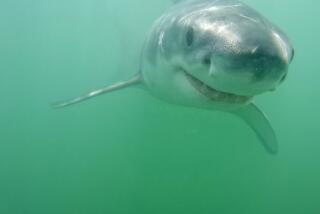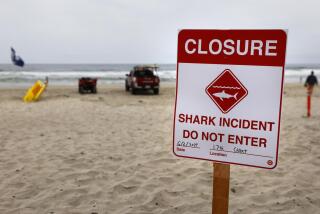Cape Cod shark: ‘I just paddled,’ kayaker says
NEW YORK — The giant dorsal fin sliced through the sparkling blue water, trailing an oblivious kayaker. Closer to shore, bathers splashed in the waves. One tourist shot video of the idyllic scene.
The only thing missing was the ominous soundtrack from”Jaws,”the 1975 blockbuster about a great white shark eating its way through a seaside resort.
That and terrified hordes fleeing the water. But this came soon enough, after a paddle-boarder spotted the huge fin behind the kayaker and shouted the one word sure to clear swimmers from the sea: “Shark!”
Within seconds of Saturday afternoon’s shark sighting, Nauset Beach on Cape Cod resembled a scene from the thriller, as bathers rushed for the sand and kayaker Walter Szulc Jr. paddled faster to get away from the 12- to 14-foot great white shark tailing his tiny boat.
“I had a deep swallow, that ‘Oh my God’ moment, then I just paddled,” he told the Boston Globe.
Unlike in the movie, everyone emerged unscathed, including the shark. But this encounter, and another one involving a great white shark the same day in Santa Cruz, served as a reminder of the dangers that lurk below — dangers that marine experts say are here to stay as colonies of sharks’ main food source, seals, flourish, and as more people hit the beach.
“We have had very clearly an increase in the seal population,” Charles “Stormy” Mayo, senior scientist at the Provincetown Center for Coastal Studies in Provincetown, Mass., said Monday. “That comes from a lot of things, not the least of which is the effort to conserve and protect marine mammals. That throws a wrinkle into the predators, and the predators are responding.”
By predators, Mayo means sharks, a species that gained infamy with the Steven Spielberg film whose memorable line — “You’re gonna need a bigger boat,” uttered as the fictional shark dwarfs the shark-hunter’s vessel — could also have applied to Szulc, out for his first kayaking expedition in a one-person craft.
The film was a box-office smash, but scientists like Mayo loathe it for its portrayal of great white sharks as mindless eating machines who deserve to be hunted down and put on display.
“They’re really quite remarkable creatures, but they suffer because they’ve got big teeth,” Mayo said. “The honest assessment is that we are much greater dangers to sharks than sharks ever have been to us.”
According to the International Shark Attack File at the University of Florida, there were 75 unprovoked shark attacks on humans last year worldwide, resulting in 12 fatalities. The United States had the most attacks — 29 — but none was fatal, said the group, whose researchers say shark attacks could be cut in half if swimmers steered clear of fishing areas and inlets where sharks gather.
But as the weekend incidents showed, it’s not always possible to avoid sharks.
Szulc, of Manchester, N.H., didn’t realize he was being followed until the nearby paddle-border, Dana Richardson, began waving and yelling, “Shark!” That’s when Szulc looked over his shoulder. “I saw the fin right away and I figured this is either it, or I’m going to paddle in,” Szulc told reporters later.
Richardson had spotted it earlier about a mile south and said it trailed him as well. He was headed for Nauset Beach to alert lifeguards.
The fish got there first.
“I didn’t want to just yell, ‘Shark, shark,’ and scare people,” said Richardson, a Cape Cod resident and longtime surfer and paddle-boarder. “But when I saw the fin following the kayaker, I began yelling and waving my paddle.”
The sighting came on the same day that a great white drew attention in Santa Cruz after chomping off the end of a kayak. The kayaker was thrown into the water and stunned, but not injured.
Nauset Beach reopened a few hours after Saturday’s incident, and swimmers were told it was safe to go back in the water. Mayo was among those taking a dip that evening, but even he looked around more than usual.
“If I’m looking over my shoulder when I really didn’t need to, I can imagine that someone from Wisconsin is freaked out,” he said.
More to Read
Sign up for Essential California
The most important California stories and recommendations in your inbox every morning.
You may occasionally receive promotional content from the Los Angeles Times.











